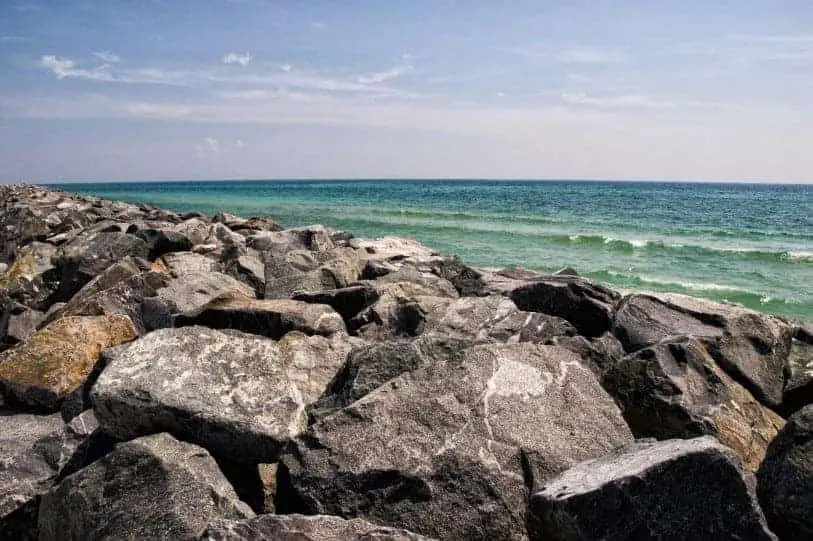Cape San Blas is one of the most beautiful places on Earth. The water is so clear and blue that you can see for miles.
The sand is white and soft - the perfect place to relax. Many people who live in this area don't even need a car!
Just hop on your bike or stroll the beach to get around town.
And if you're looking for something fun to do, there's always something going on at Cape San Blas, Florida: festivals, concerts, sports games - you name it!
Is the water clear in Cape San Blas, Florida?
In short, yes. The water is clear in Cape San Blas, Florida. It's probably the clearest I've seen anywhere!
There are several reasons for this:
The water is shallow. This means there are not many waves and sedimentation to cloud it.
The water is warm all year round, which helps keep it clear because warmer temperatures inhibit algae growth.
Due to the warm water, you'll also notice fewer jellyfish here than on other beaches (they don't like it too hot, either).
The protection offered by the Gulf of Mexico and Cape San Blas islands helps keep nutrients from entering our waters, causing excess algae growth or pollution runoff into our bayous and estuaries.
We swim every day during low tide after sunset each night during the summer months when daylight hours are longer than regular hours at around 10 pm.
So, if you plan on staying longer than one night while visiting us in Florida, plan accordingly with your schedule.
We welcome everyone regardless of race, ethnicity, religion, gender, or orientation.

Where is Cape San Blas in Florida?
The Cape is located in the panhandle of Florida, just north of Apalachicola. It's on the same peninsula as St. Joseph's Island, where you'll find some of the most pristine beaches in all of Florida.
For example, once you get to St. Joseph's Island State Park, you can enjoy miles of white sand and beautiful blue waters - and it's only a short drive from Cape San Blas!
How long is Cape San Blas peninsula?
Cape San Blas is a peninsula at the northernmost point of the Florida Panhandle, stretching into the Gulf of Mexico.
It is about 30 miles long and reaches down to St. Joseph Bay and Apalachicola Bay on either side.
The Department of the Interior has also designated it a national seashore, which means it's protected for its natural beauty and ecological resources.
This designation is much of what attracts people to visit Cape San Blas year-round - people enjoy the great outdoors, camp in tents or cabins on the beach, go hiking and biking in preserved areas, and more.
Does Cape San Blas have white sand?
The sand is light brown, not white, golden, pink, red, grey, or black.
We don't know where the myth that our sand is white started, and we'll be honest - we're kind of upset about it because it's annoying to have people come to visit and then say, "I thought this was going to be like Hawaii."
We understand why people think it might be white - it has a light brown tint when you look closely enough, so maybe that's where the confusion came from.
But no! If you want white sand beaches, go somewhere else! We promise plenty of other beaches with white sands if that's what you're looking for (just not here).
Are there sharks at Cape San Blas?
If you're concerned about sharks at Cape San Blas, don't worry. The area is not known for its shark population.
There are no documented cases of shark incidents on humans in the region. There are only two documented cases in Florida: one off Key West and another on a beach near Miami.
Sharks do exist in the Gulf of Mexico, though they aren't familiar there either - and they're even more uncommon there than in other oceans and seas worldwide (the Atlantic Ocean has an average shark population density twice as high).
So, while your chances are slim that you'll encounter one while swimming at Cape San Blas, it's better to be safe than sorry!
Are there alligators in Cape San Blas?
American alligators can be found in all parts of Florida, including areas outside wildlife reserves.
They can be in any body of water; over a million are in the state.
It's important to note that alligator activity can increase during their mating season, which usually begins in earnest in May and June.
During this time, alligators may be more visible as they seek mates. However, incidents involving alligators and humans are still rare.
With this in mind, while it's possible to encounter an alligator in Cape San Blas, it's also highly dependent on the specific time, location, and circumstances.
Conclusion
And there you have it! We hope this information has answered some of your questions about Cape San Blas.
And don't forget, no matter what kind of person you are or how much money you make.
Everyone deserves to experience the magic that is Cape San Blas.
